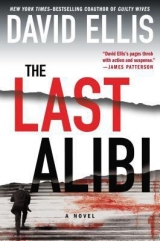
Текст книги "The Last Alibi"
Автор книги: David Ellis
Жанры:
Триллеры
,сообщить о нарушении
Текущая страница: 26 (всего у книги 31 страниц)
95.
Jason
“I’m going to replay a small portion of the police interview, Jason.”
Bradley hits “Play” on the computer. The projection screen comes alive. The jury gets to hear this snippet of the interview for a second time:
“You told me back at your house that you have a pretty good idea who killed Alexa,” Cromartie says. “Can you help me out with that? Who killed her, Jason?”
I don’t answer at first. Several seconds pass. I shake my head and wave a hand. “His name is Jim.”
“Last name?” Cromartie asks.
“Just Jim,” I say.
“Well . . . what can you tell me about Jim?”
The way Cromartie says Jim, it’s like he’s dealing with a little kid who is obviously lying.
“He . . . he has red hair,” I say. “He’s big, muscular. He wears glasses. He has a paunch, like, a gut.”
Bradley stops the recording. “Jason, who did you mean by ‘Jim’?”
“He was someone who came to my office. It would have been very early this summer. I want to say the first full week of June.”
“What was his name?”
“He gave the name James Drinker. He said his name was James Drinker, that he worked at Higgins Auto Body here in the city, and that he lived in an apartment building at the intersection of Townsend and Kensington in Old Power’s Park.”
Roger Ogren and Katie O’Connor are scribbling feverishly, trying to keep up.
“Can you describe this individual from a physical standpoint?”
“He was a very odd-looking person. He had long, kind of curly red hair. Thick black glasses. He was very muscular, like a weight lifter. And he had a big protruding stomach, a beer gut, I guess. Just like I told Detective Cromartie.”
“What did you two discuss?”
“I can’t answer that,” I say. “When a client comes in and tells me something, I’m sworn to confidentiality under the attorney-client privilege.”
“What if you, as an attorney, think this client is kind of shady? Up to no good?”
“That makes no difference. The privilege sticks.”
“What if it turns out he’s lying to you about his true identity?”
I shake my head. “It doesn’t matter. If the attorney-client privilege were broken every time a client lied to his lawyer, very few clients would have the privilege. Plenty of clients have lied to me over the years, Bradley, on big things and small things. It doesn’t eviscerate the privilege.”
“Does the privilege always apply, no matter what?”
“Basically, yes. The only exception is if the client tells me—I mean, literally tells me—that he or she is going to commit a crime. If I hear them say that, I have a duty to report them.”
“Did that happen here?”
“No, it did not. I may have had my suspicions—well, I did have my suspicions. I can’t give you the details of what we discussed, but he never said he was a killer, much less that he was planning to kill again. So I had to keep it all confidential.”
“Let me jump forward in the police interview, Jason.”
Bradley, who knows computers better than I ever will, dials up the next passage, skipping a handful of questions.
“Did this . . . Jim tell you that he was going to hurt Alexa?” Cromartie asks. “Or you?”
I shake my head. “Not in so many words. I wish he had. If he had, maybe I could have done something.”
“I don’t understand what that means,” Cromartie says.
Stop tape.
“Detective Cromartie said he didn’t understand what you meant by that, Jason. Can you tell us what you meant?”
“Well, it’s just what I explained. He was my client, for the purposes of the privilege, the moment he entered my office. If this individual had told me that he was going to hurt Alexa, or me, or anyone else, for that matter, I could have done something. I could have reported him. That’s why I said, ‘I wish he had’ told me that. I didn’t know he was going to hurt Alexa. It never occurred to me.”
“Objection,” says Ogren. “We’re assuming facts not in evidence, and there’s no foundation for that statement. There’s absolutely no evidence in the record that this unknown man of mystery did anything at all to Alexa Himmel.”
“I’ll sustain that objection,” says the judge, “but let’s limit the speeches, Mr. Ogren.” The judge has the court reporter read back my answer and strikes the last two sentences.
“Well, Jason, regardless of what this man calling himself James Drinker may have done, did he ever give you any indication that he was going to hurt Alexa?”
“No, he didn’t.”
“Very good. This man, ‘James Drinker.’ Did you confirm that there was, in fact, a man named James Drinker who worked at Higgins Auto Body and who lived at 3611 West Townsend, here in the city?”
“I did confirm that, yes. So I assumed he was on the up-and-up.”
“How many times did you speak with this man?”
“Twice at my office, in early June.”
“Any other time?”
“Well, in a manner of speaking, yes.”
“Explain that.”
“In very late June, let’s say that . . . well, a crime had been committed that concerned me. By that, I mean, I was concerned that my client had committed that crime. And I wanted to discuss it with him.”
“Did you call him?”
“I couldn’t call him. He left no home phone and no cell phone. On rare occasions, I would speak with him by phone, but it was always him calling me, and it was always on one of those disposable phones you buy at the convenience store with a blocked phone number. So I had no way of calling him.”
“So what did you do?”
“I went to his house. I believe it was a Saturday. The last Saturday in June. His apartment at 3611 West Townsend, in Old Power’s Park. I think his apartment number was 406.”
“Did James Drinker answer the door?”
“Yes, he did.”
“Describe his appearance.”
“The same general characteristics. Long curly red hair, big muscles, black glasses, a big gut. Still funny-looking. But it wasn’t the same person.”
“Can you explain that?”
“The person living at that apartment, James Drinker, had all the same general features as the man who came to my office. But it was clearly a different person. Different eyes, without the glasses on. Different nose. Different voice. I apologized to the guy and I left.”
“So, Jason. What did this mean?”
“The man who came to my office gave me a bogus name and wore a disguise.”
Roger Ogren actually chuckles a bit, then raises his hand in apology.
“That’s okay, I thought it was crazy, too,” I say. “Why would a client come to you, for a confidential discussion, and wear a disguise and give a fake name?”
“And did you come to discover an answer to that question?” Bradley asks me.
“Yes,” I say. “Because he was afraid I would recognize him. And because he wanted to mess with me.”
“Objection,” says Roger Ogren. “Foundation.”
“Sustained.”
“Okay, you need to explain that,” Bradley says, as if he’s just as curious as the jury, and the prosecution, and my brother, Pete, sitting in the gallery, must be. “Did you come to learn this person’s true identity?”
“I did. This person’s name was Marshall Rivers.”
Roger Ogren looks like he’s about to drop his pen.
Annnnd there, he drops it.
“And who was Marshall Rivers to you?”
“About eight, nine years ago, when I was a prosecutor, I took a confession from Marshall Rivers on a gun charge. Possession of a firearm. We were also looking at him for trying to forcibly abduct a woman and her child.”
“And you said you took his confession?”
“Yes, I was the prosecutor assigned to the police station where he was brought in after his arrest.”
I begin to provide the details from that night, as best as I can remember them. I recall the big picture, but not the small details. The whole thing doesn’t particularly stand out in my mind, because I dealt with dangerous criminals like him every day, and because the mind games I used on Marshall were the kinds of methods I employed on a daily basis during Felony Review.
Before I get too far, Roger Ogren objects and asks for a sidebar with the judge. I’m not privy to the conversation between the judge and the lawyers in the far corner of the courtroom, but I know Bradley is arguing that the details of my interrogation of Marshall Rivers are very relevant.
The judge overrules the objection. Bradley walks me through that entire sequence of events. I wish I didn’t have to emphasize what I did to Marshall, because it shows the jury a side of me that is less than forthcoming, even devious. But the details show why Marshall was pissed off at me. It shows his motive to do what he did to those women and, in his mind, to me.
“Ultimately, Marshall got around six years in federal prison, because he was a repeat offender,” I say. “He ended up getting into some trouble while in prison and received additional time. But the initial six years, they came from the confession we took. From the confession I took.”
“And when did he leave prison, if you know?”
“He left in January of this year. He moved back to the city. And according to the police, he was responsible for the murder of five women in this city this past summer.”
“The murder of five women?” Bradley asks.
“That’s right,” I say. “Marshall Rivers was the man the media has called the North Side Slasher.”
96.
Shauna
Some of the spectators didn’t immediately place the name Marshall Rivers, but all of them have heard of the North Side Slasher. The judge gavels loudly, but it takes her a couple of times to establish order. These are small courtrooms, and when it gets loud, it gets loud. The criminal courts, I’ve come to learn, are a lot rowdier than the civil courtrooms where I typically roam.
The north side murders were officially “solved”—if that’s the right word—one week after Alexa was killed. I remember seeing the Wednesday, August 7, edition of the Herald in a grocery store, the headline “We Got Our Guy” above a photograph of the mayor, the police superintendent, and several police detectives gathered at a news conference. Word had leaked over the previous weekend that the police believed they had broken the case, but it wasn’t until the following week that the rumors were made official.
“He was your client, Jason?” asks Bradley John.
Jason lets out a chuckle of bemusement. “Yes. I mean, under an assumed name, and wearing a disguise. He never told me he was going to kill anybody, nor did he outright admit he had killed anybody. And he never gave me his real name or showed me his real face.”
Technically, explaining what a client didn’t tell you isn’t a breach of the attorney-client privilege. But Jason’s getting in the vicinity of being too cute.
“So yes, he was my client, but he was also a mystery to me. I think he blamed me for his time inside and he wanted me to know that he was killing people, and there was nothing I could do about it, because of the privilege. He wanted to torture me. And it worked.”
“Jason, are you certain that the man who came to your office was Marshall Rivers, wearing a disguise?”
“I am,” says Jason. “I’ve seen many photos of him in the newspaper since he was found dead. Put a red wig on him and one of those fake fat suits for a belly and it works.”
Roger Ogren is not having a good half hour. He would have the typical anxiety of any prosecutor when the defendant takes the stand, having no idea what he’ll say and expecting to have to audible a cross-examination. Roger’s done that many times. And I assume he would regard Jason, his former colleague, as something other than your ordinary defendant, so he knew this might be a rough one for him. But surely he didn’t expect this.
He probably assumes we have a lot more evidence to put in, more witnesses to call, additional facts to bolster our theory. So this final question-and-answer may be a pleasant surprise to him.
“Jason,” Bradley asks, “do you know for a fact that Marshall Rivers killed Alexa Himmel?”
“No,” he answers. “I would have no way of knowing for certain. I was arrested only hours after Alexa was murdered, and I’ve been locked up since then.”
Bradley John looks over at Roger Ogren, then at the judge.
“No further questions,” he says.
97.
Shauna
“So when did you discover all this information about Marshall Rivers?” Roger Ogren says to me as we head into chambers after the completion of Jason’s direct examination. “Before the arraignment? Before the prelim? Six goddamn months ago?”
“Children, children.” Judge Bialek makes a calming gesture with her hands.
“Mr. Ogren’s upset, Your Honor,” I tell her. “His case is falling apart.”
The judge, already out of the black robe she detests, looks over her glasses at me with disapproval. And maybe disagreement, too. There was some sizzle this afternoon with the cameo appearance of the North Side Slasher, but no steak: At the end of the day, we have put on no concrete proof that Marshall Rivers played the part of James Drinker in Jason’s office, and we have absolutely no proof whatsoever that Marshall Rivers killed Alexa Himmel.
“Mr. Ogren,” she says, taking a seat and folding her hands. “I think the answer is probably that the defense did have this information long ago, but Ms. Tasker wanted to surprise you with it. She didn’t want you to have time with it, to play with it, to investigate it, to refute it. She wanted to spring it on you so you’d be caught flat-footed in the middle of trial without any time to respond.”
“I think you’re absolutely right, Judge,” Ogren agrees.
“The problem for you, as you well know, is that she’s perfectly entitled to do that very thing. She hasn’t violated any discovery rule that I’m aware of. She’s not trying to introduce a piece of evidence that she didn’t disclose. And there’s no affirmative defense for Someone else killed her, not me, so she didn’t have to disclose that, either. And I’m going to guess that there’s a reason that Ms. Tasker put the entire roster of Area Three detectives on her witness list. I’m going to guess that Area Three handled both Ms. Himmel’s case and the north side murders?”
“Indeed, they did,” I say, without a smirk.
“Mr. Ogren, I think you’ve had your pocket picked fair and square.”
He shakes his head, bemused. “I need a continuance, Judge.”
“Well, I’m not going to give you one. I have Mr. Kolarich’s cross-examination scheduled for completion tomorrow.”
“I need more time.” Ogren’s tone is defiant, not pleading. “In the interests of justice, I need more time.”
The judge pauses, purses her lips, thinks about it. “Ms. Tasker, who else are you planning on calling?”
“Our next witness will be Detective Vance Austin, the lead investigator on the north side murders.”
The judge nods. “Is that all?”
“It depends on what he knows, Judge. But that’s my current plan.”
“All right. Good enough. Mr. Ogren, when the defense rests, which could be . . . Monday or Tuesday?” She looks at me for confirmation; I shrug. “Whenever that happens, I’ll hear any request you may have on a continuance before you put on your rebuttal case. But Mr. Ogren, hear me and hear me well: Don’t be optimistic. I would strongly advise you to put your Area Three detectives to good use between now and Monday.”
“I understand, Judge.”
“Cross-examination tomorrow morning at nine,” the judge says. “That’s all.”
PEOPLE VS. JASON KOLARICH
TRIAL, DAY 5
Friday, December 13
98.
Jason
Roger Ogren didn’t get a lot of sleep, but he appears eager nonetheless as he looks me over before he begins his cross-examination. Maybe it’s the packed room. The trial has typically been well attended, but now it’s standing room only, people lining the walls, talk of a second room being set up to accommodate the overflow. My mention of Marshall Rivers yesterday has turned the media into a pack of howling canines—with all necessary apologies to howling canines.
“Good morning, Mr. Kolarich.”
“Mr. Ogren.”
“Very exciting testimony yesterday,” he says. “The North Side Slasher.” He makes a wow gesture with his hands, a look of wonderment. He pulls it off better than I might have expected. Roger’s kind of a fuddy-duddy, but he’s pissed off, and the electricity animates him. It doesn’t bode well for me that he’s got some game today.
“So let’s just be clear up front. You can’t say for a fact that Marshall Rivers killed Alexa Himmel, can you?”
“For a fact? No. I wasn’t there when it happened.”
“You can’t place Marshall Rivers at the scene of the murder, at the time of the murder, can you, Mr. Kolarich?”
“I can’t say one way or another where he was, no.”
“The murders attributed to Marshall Rivers on the north side this summer—those were stabbings, were they not? Multiple stab wounds on each victim?”
“That’s my understanding, yes.”
“Alexa Himmel wasn’t stabbed, was she?”
“No.”
“She was shot just below the neck.”
“That’s correct.”
“You can’t even prove that Marshall Rivers ever set foot in your law office, can you?”
“Prove it? I’m saying it was him.”
“You’re saying it was him . . . based on seeing his picture in a newspaper?”
“That’s right.”
“Marshall Rivers didn’t have red hair, did he?”
“No.”
“Marshall Rivers did not have a large, protruding stomach, did he?”
“I am not sure I know that answer, Mr. Ogren. Most of the newspaper photos were head shots.”
“So you don’t know if Marshall Rivers’s midsection was . . . fat, pudgy, what have you. You don’t know.”
“Correct, I don’t know. But Marshall Rivers was very muscular in the chest and shoulders, just like the man who came to my office. That’s the part you can’t fake, Mr. Ogren. You can put on a wig. You can give yourself a fake belly. But muscles in the chest and shoulders? You can’t fake that.”
Ogren pauses a beat, frowns. He could object to my unsolicited statement, but he’s going to have to deal with it sooner or later, so he lets it slide.
“You’re describing for us the build of Marshall Rivers’s chest and shoulders, as you observed them from a head shot. In a newspaper photo.”
“Best I could do, Mr. Ogren. They weren’t all head shots. Some were wider angles. And I also interrogated him, remember. I took his confession. He was very stocky then.”
“Then being over eight years ago, true?”
“True. Yes.”
“And the build of his upper body, you say, resembled that of the man who came to your office.”
“Correct.”
“And this man who came to your office—you haven’t shown the jury any photographs of this person, have you?”
“Photographs? I’m a criminal defense lawyer, Mr. Ogren. People come to me to share their secrets. Most clients wouldn’t take too kindly to my snapping a photo of them when they walk in the door.”
Ogren’s eyes narrow at my jab. A couple of the jurors find it slightly amusing, but this isn’t the time to be glib. I need to watch myself.
“So when you say that Marshall Rivers’s build resembled that of the man who came to your office—we only have your word for that.”
“I guess that’s true, yes.”
I could give them Marie, who spent some time with my redheaded client and who could describe him as well as I could. But I’m not making Marie take the stand. I don’t need to.
“Okay. Let’s talk about your police interview.” Ogren reviews his notes on the podium. He uses them for guideposts, nothing more. “You admit that you lied to Detective Cromartie in the police interview several times?”
“I did lie, yes.”
“You lied about the status of your relationship with Ms. Himmel.”
“Yes. As I said, I was trying to be—”
“Respectful of her,” Ogren finishes. “Yes. Having been a prosecutor for eight or nine years, you understood the importance of getting accurate and complete information from witnesses, didn’t you?”
“Yes, of course.”
“Witnesses who think they can decide for themselves what information is important and what information is not—they can really hinder an investigation, can’t they?”
“Yes, that’s true.”
“And you knew that back on July thirty-first, when you were giving your interview.”
“Yes, I knew that.”
“But you repeatedly lied, anyway.”
“I lied about my relationship with Alexa, yes.”
“When you were being interviewed by the police, you didn’t say anything about a serial killer, did you?”
“What could I say, Mr. Ogren? First of all, I didn’t know for a fact he was a serial killer. And second, even if I did, I didn’t know his name. I knew his fake name, but how was that going to help?”
“So instead, you gave half a fake name. You gave the name Jim, but no last name.”
“That’s right. I sort of caught myself mid-sentence and just left it at ‘Jim.’”
That, of course, was not an accident.
“Nothing was stopping you from saying ‘James Drinker’ or ‘Jim Drinker,’ was there, Mr. Kolarich?”
“Stopping me? I wasn’t totally sure whether I could even give out his first name, given the privilege.”
“I see. That attorney-client privilege, that worked out pretty well for you, didn’t it, Mr. Kolarich? You could drop a name, or half a name, and then hide behind it, isn’t that right?”
“Objection, argumentative,” says Bradley John.
“That’s okay, I’ll answer that,” I say. “I’m willing to answer that, Judge.”
“Your Honor, I’ll withdraw my objection,” Bradley says. “I apologize.”
The judge isn’t too thrilled with this whole exchange, but waves me on.
“There’s nothing convenient for me about this attorney-client privilege. If it weren’t for that privilege, Mr. Ogren, I would have called the police the first time I met with this man who identified himself as James Drinker. I didn’t have direct, concrete proof that he was a killer, but I certainly had my suspicions. And I would have been more than happy to tell Detective Cromartie all about him. But at the time of that police interview, I didn’t know the name Marshall Rivers. All I knew at that time was this guy came to my office twice, gave the name James Drinker, and it was a fake name. That’s all I knew. I didn’t know his true identity.”
I glance at Shauna, whose eyes break from mine. She suspects I’m lying, but doesn’t know for certain. She doesn’t know what happened when I went over to Alexa’s house that evening after the 8:16 P.M. phone call to my house. She doesn’t know that I heard Joel Lightner telling me, via voice mail, that Marshall Rivers was the north side killer.
She doesn’t know what happened afterward, either.
“Then let’s talk about Alexa Himmel,” Ogren says, moving away from a bad moment. He goes to the prosecution exhibit showing Alexa’s letter to the Board of Attorney Discipline. “You testified that you went to see Ms. Himmel, and she told you that she wasn’t really going to send that letter.”
“That’s right. She was trying to get my attention. But she wasn’t going to send it.”
“Were you alone when you went to see Ms. Himmel?”
“Yes, I was alone.”
“Can anyone verify that you went to see her?”
Shauna can.
“Not that I know of,” I say.
“No one else was there, besides you and Ms. Himmel?”
“No.”
“Other than your word, do we have any proof at all that this conversation even happened?”
“Other than my word? No.”
“But we do have independent proof that Alexa Himmel was saying things to you like . . . oh, let’s see.” Ogren finds one of the e-mails and puts it up on the screen. “That ‘your going to be seriously fucked.’ We have proof she said that to you, in an e-mail, don’t we?”
“Yes, we do.”
“And that she called you a ‘coward’ and said you ‘lied to her’ and you left her to die. We have proof she said that to you, don’t we?”
“We do.”
“And we have proof that she had gone to the trouble of preparing an entire letter to the disciplinary board that oversees lawyers, accusing you of misconduct. We have proof she did that, don’t we?”
“We do.”
“But this one conversation where, apparently, Alexa Himmel said to you, ‘Don’t worry, Jason, I’d never hurt you,’ that conversation, we only have your word.”
“You only have my word, yes.”
“And we have proof—in fact, you’ve admitted—that in the past, when it comes to Ms. Himmel, you’ve been willing to lie.”
“I did lie at the police interview, yes.”
He’s doing a pretty good job of kicking me in the balls here.
“The night of the murder, Mr. Kolarich. Can anyone verify that you were at the beach from mid-afternoon until sometime after sundown?”
“Not that I know of.”
“Can anyone verify that you went for a three– or four-hour drive around town afterward?”
“No. Just me.”
“You didn’t make a single phone call on your cell phone during that entire interval of time, did you?”
“I don’t remember making any. I’m not entirely sure from my own memory, but the CDRs you pulled of my cell phone for that night say I didn’t, and I have no reason to quarrel with that.”
“You didn’t stop for gas.”
“No.”
“You didn’t even eat food, did you?”
“I—no, I don’t think—well, I brought some granola bars with me. I remember I ate granola bars on the beach. There wasn’t much food I could hold down when I was going through withdrawal. But those granola bars I could eat.”
“What kind of granola bars, by the way?”
“Oh, they come in a green box. They’re hard, not soft. Oats and honey flavor, I think it is.”
“What brand?”
“I don’t know the name of the brand. Green box.”
“The call to your home phone at 8:16 P.M. on Tuesday, July thirtieth,” he says, jumping quickly, having taken a shot with the granola thing, trying to catch me in a lie but not scoring. “You say it was a voice mail.”
“Correct.”
“You listened to it after you called 911, you said.”
“Right.”
“You never mentioned it to Detective Cromartie, did you?”
“The voice mail? No, I’m sure I didn’t.”
“Or to the patrol officer who first responded.”
“I’m sure I didn’t.”
“So we have to take your word for that, too. The fact that there was a voice mail.”
“You do.”
Ogren flips around his notes. He’s probably close to done. He should be, anyway. Quit while you’re ahead. And he’s definitely ahead.
“One final topic,” says Ogren. “The matter of Alexa Himmel’s supposed house key.”
“It’s not a supposed house key. I gave her a key to my house.”
“When did that happen, Mr. Kolarich?”
My eyes drift to the ceiling. “Oh, the beginning of July. About the time she moved in with me.”
“Where did you get it made?”
“Witley’s Hardware down the way from my house, about three blocks.”
“Did you pay for it with a credit or debit card?”
“A credit card? It was, like, four or five dollars. No, I believe I paid in cash.”
“You’ve never paid for something that was four or five dollars with a debit card? You’ve never swiped your debit card at a McDonald’s or a Walgreens?”
Knowing Ogren, he’s memorized my credit card bills and will point to examples where I did that very thing. So I have to tread lightly. “I imagine I have, yes,” I say.
“But not for this purchase. For this purchase, it was cash.”
“That’s right. But I did buy it. She did have a house key.”
“But you have no corroboration for that.”
“I don’t.”
“And you can’t tell us what happened to this . . . this key.”
“No.”
“Nor can you explain to us how Alexa Himmel got into your house before you were home, if she didn’t have a house key.”
“But she did have a house key, Mr. Ogren, and that’s how she got in. I just don’t know what happened to it.”
“But we’re taking your word, and your word alone, for that, as well.”
I sigh. “I guess you are, Mr. Ogren.”
Roger has done a valiant job of showing that every piece of our defense, thus far, has been built on my testimony and mine alone. The word of an admitted liar! A man who would say anything to stay out of prison! Do not believe that man!
“Your Honor, we reserve the right for further questioning during rebuttal,” Ogren says. “But for the time being, I have nothing further.” He only had last night to prepare for this cross-examination, after I threw out all sorts of things yesterday I’d never said publicly. He did well, very well with the time he had. But he’s not done with me by a long shot. The prosecution gets a rebuttal case, and he surely has already mobilized his considerable resources to proving that the things I’ve said on the witness stand are lies.
Many of them are, of course. Some of them are not. We’ll see what his cops can come up with over the next few days.








